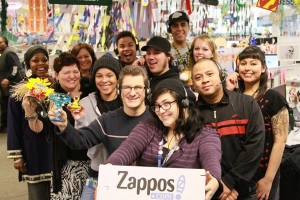Cult brands personify human attributes.
No, brands are not real people, but they do need a real voice.
The brands consumers bond with are those to which they, as human beings, can most easily relate. Brands’ with human characteristics such as honesty, humility, sympathy and generosity are much more appealing to consumers, this often translates into preference towards these more relatable brands.
If you are a marketing leader having a hard time figuring out the core personality of your brand, think of it like a real person. Picture your brand having Emotional Intelligence, and take an EQ test to help identify the human qualities your brand should show. Clearly defining and showcasing a brand’s appealing persona will make it stand out, and — someone, not just something, that consumers will want to connect with.
Relatable Stereotypes
Marketing thought leader and founder of Fidelum Partners, Chris Malone, is an expert in the field of “Brand Perception”, which is the idea that a brand’s perceived intentions affect the way consumers regard and behave towards that brand. According a 2010 study by Fidelum Partners on the power of brand warmth and competence, the human traits brands exhibit influence 50 percent of all purchase intent, loyalty and likelihood to recommend. That’s extremely significant and underlines why it is imperative to find those touchpoints along the customer journey where your brand should be most relatable to consumers.
Everything from product packaging, staff name tags and purchase receipts can be opportunities for a brand to convey relatable attributes.
While researchers are still learning more about how persuasive ‘humanness’ can be, some brands have already unlocked the power of relatability.
Pranayama with Personality

Understanding how your product fits into your customer’s lifestyle is key to becoming something more than just another company.
Because Lululemon had worked so hard to forge meaningful bonds with customers, people were especially shocked and upset when Lululemon founder, Chip Wilson, defended the quality of recalled yoga pants. Wilson’s denial of the issue felt like a stab in the back to its loyal fan base. But, Lulu later came out with the ‘Second Chance Pants’ as a make good on the recall, thereby admitting its mistake and offering a gift to gain forgiveness. What a human thing to do.
Assigning human characteristics to a brand is particularly important if things should ever head south. While a transgression initially feels more hurtful to people in a customer-brand relationship, those same people also tend to feel more compassion toward that brand, forgiving, and ultimately repurchasing the brand in future.
Assigning human characteristics to a brand is particularly important if things should ever head south.
Academics at the University of California’s Marshall School of Business found that consumers are less likely to seek revenge on brands they can forgive and are even willing to defend these brands against naysayers.
Feeling Good About Good Food

In a restaurant category where ambiguous ingredients and deceptive advertising seem to be the norm, the Scarecrow fortifies Chipotle’s position as the nice guy who just wants to make the world a better place. A toddler could relate to such a basic and agreeable human trait.
Don’t Mask it with a Mascot
But be aware that Chipotle’s use of a character to represent brand persona should not be confused with mere mascots and spokesmen. The Aflac Duck has made for a memorable ad campaign, but he is not the persona of the insurance company. Cult Collective’s Chris Kneeland emphasizes that, “Mascots and spokesmen come and go, but brand personas should reflect long-standing company values and inform all touchpoints.”
Real Humans Seen Here
Some brands have risen to cult status not by so much by portraying human-like qualities, but instead by exposing the actual human labor force behind the brands. Chris Malone reminds us that all commerce used to be done face-to-face. Obviously that is not always the case today, but our brains are still looking for information on the people who make the products we use. Humanness carries a lot of content that isn’t conveyed through written word, and that is why consumers have responded so positively to brands like Zappos and Dominos Pizza, who place their employees front-and-center in a bid to garner trust and loyalty from consumers.
Humanness carries a lot of content that isn’t conveyed through written word.

Putting a face to your brand pays off, people want to see who they are buying from.
Dominos Pizza has made market gains ever since 2009 when its CEO, Patrick Doyle, appeared in commercials to apologize for Dominos’ old pizza recipe, which was less than stellar to say the least. People responded so positively to Doyle’s humble, human apology, that Dominos has consistently featured real employees’ personal stories in marketing campaigns ever since. Dominos’ valiant attempt to put a human face on its brand has paid off, as consumers prove they want to trust real people and offer them their support.
Apple’s Psychological Edge

Through the “Get a Mac” ads, Apple succeeded in personifying its brand while simultaneously driving a psychological wedge between Mac users and PC users.
Say it Like You Mean It
The more consumers know about, and relate to, your brand’s personality, the more likely they are to become loyal customers. However, brand characteristics are not just catchphrases to be sprinkled throughout annual reports and marketing campaigns. Your brand must actually become the personality you have created for it.
Relatable brands…
- Make their values and personalities present at every touchpoint.
- Can be readily associated by consumers with someone they admire and know or would like to know.
- Behave in human ways, including admitting faults and owning up to mistakes.
Cult brands operationalize their personalities and convey character traits that are also present within positive, trustful, human-to-human relationships.